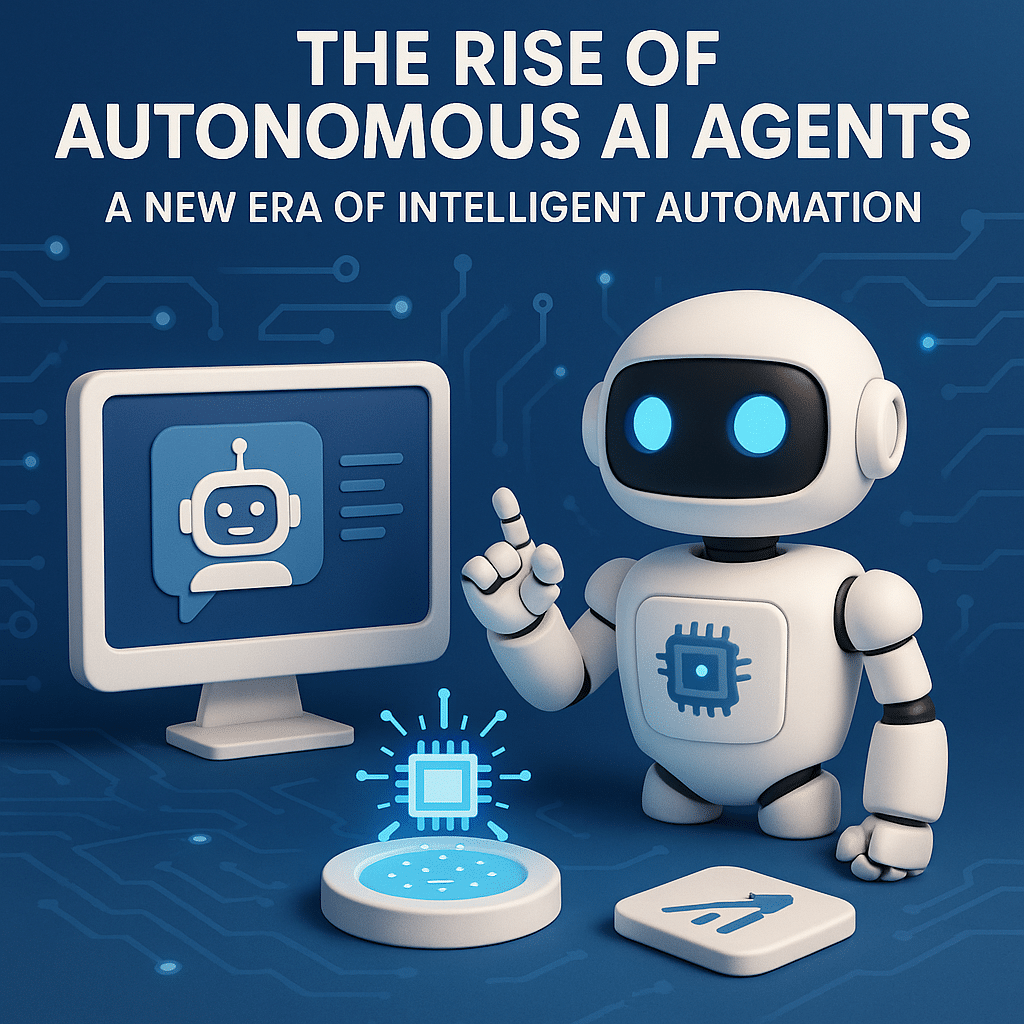The Rise of Autonomous AI Agents: A New Era of Intelligent Automation
Richmond Oppong
March 3, 2025

Introduction
Artificial Intelligence (AI) is undergoing a powerful transformation. What began as tools to assist humans in isolated tasks has evolved into something far more capable: autonomous AI agents.
These advanced systems are no longer just responding to prompts. They’re initiating tasks, making decisions, and driving outcomes with minimal human intervention. As 2025 unfolds, the rise of autonomous AI agents is becoming one of the most significant developments in the AI space.
What Are Autonomous AI Agents?
Autonomous AI agents are self-operating software systems that use advanced language models and reasoning mechanisms to perform tasks on behalf of humans. Unlike traditional automation tools that follow rigid scripts, these agents can:
- Plan multi-step actions
- Make independent decisions
- Interact with digital tools like browsers, APIs, or file systems
- Learn from outcomes and adapt over time
Essentially, they act as digital teammates, capable of running entire workflows, coordinating with tools, and even interacting with other agents.
Why Are They Trending Now?
Several technological breakthroughs are driving the rise of autonomous agents:
- More powerful models: The release of language models like GPT-4 and Claude has dramatically improved an AI agent’s ability to reason and understand nuance.
- Agent frameworks: Tools like AutoGPT and OpenAI’s experimental agents now allow users to create agents that can browse the web, write code, or manage calendars autonomously.
- Tool integration: These agents can now use APIs, plug-ins, and local tools to act on real-world environments, such as sending emails, booking appointments, or generating reports.
- Memory and planning: Modern agents can remember previous steps and outcomes, allowing for more coherent task execution across time.
Together, these advances are transforming agents from assistants into independent actors.
Real-World Use Cases
Autonomous agents are already being deployed across various sectors:
- Software Development: Tools like Devin AI act as full-stack AI software engineers, capable of writing, debugging, and deploying applications autonomously.
- Customer Support: AI agents can now manage support tickets end-to-end, escalating only the most complex issues to humans.
- Marketing: Autonomous agents are running ad campaigns, scheduling social media posts, and analyzing performance metrics in real time.
- Business Operations: Enterprises use agents to automate HR tasks, process invoices, or manage logistics, saving hours of manual work.
These capabilities are leading companies like Salesforce, Microsoft, and Google to invest heavily in agentic AI as the next frontier of business productivity.

Opportunities and Challenges
While autonomous agents offer exciting possibilities, there are important considerations:
- Opportunities
- Increased productivity with minimal overhead
- 24/7 operations without human fatigue
- Enhanced decision-making through real-time data access
- Challenges
- Security and ethical risks when agents act without oversight
- Dependence on model accuracy and robustness
- Need for regulation and human-in-the-loop safeguards
The rapid development of these systems has outpaced regulation, raising questions about accountability, transparency, and data privacy.
The Future of AI Agents
In the coming years, we can expect agents to become more collaborative, personalized, and embedded in everyday tools. Teams may delegate routine project management or research tasks entirely to agents, allowing humans to focus on creativity, leadership, and emotional intelligence.
The rise of autonomous AI agents is not just a trend. It’s the beginning of a shift toward machine-driven productivity, where humans and intelligent systems collaborate more deeply than ever before.
Conclusion
Autonomous AI agents represent a bold new chapter in the evolution of artificial intelligence. As their capabilities continue to mature, businesses and individuals alike will need to consider how to integrate these systems ethically and effectively. The future belongs to those who are ready to work with intelligent agents, not just use them.
References
Financial Times. (2025). AI agents move from co-pilot to autopilot. Retrieved from https://www.ft.com/content/3e862e23-6e2c-4670-a68c-e204379fe01f
OpenAI Blog. (2024–2025). Updates on AI agents and planning capabilities. Retrieved from https://openai.com/blog
AutoGPT GitHub Repository. (2024). AutoGPT – An experimental open-source attempt to make GPT-4 fully autonomous. Retrieved from https://github.com/Significant-Gravitas/AutoGPT
McKinsey & Company. (2023). The state of AI in 2023: Generative AI’s breakout year. Retrieved from https://www.mckinsey.com/featured-insights/the-state-of-ai-in-2023-generative-ais-breakout-year
Cognition Labs. (2025). Introducing Devin: The first AI software engineer. Retrieved from https://www.cognition-labs.com
TechCrunch. (2025). The agentic AI boom: Devin, AutoGPT, and what’s next. Retrieved from https://techcrunch.com
ArXiv Preprint. (2025). LLM Reasoning and Autonomous Agents: A Technical Overview. Retrieved from https://arxiv.org/abs/2504.19678
The Future of Blockchain in Supply Chains
Feel Free To Contact Us
Wada plan to collaborate with trusted local and international electronic and print media outlets to inform the public about decentralized applications to accelerate adoption.
- hello@wada.org
